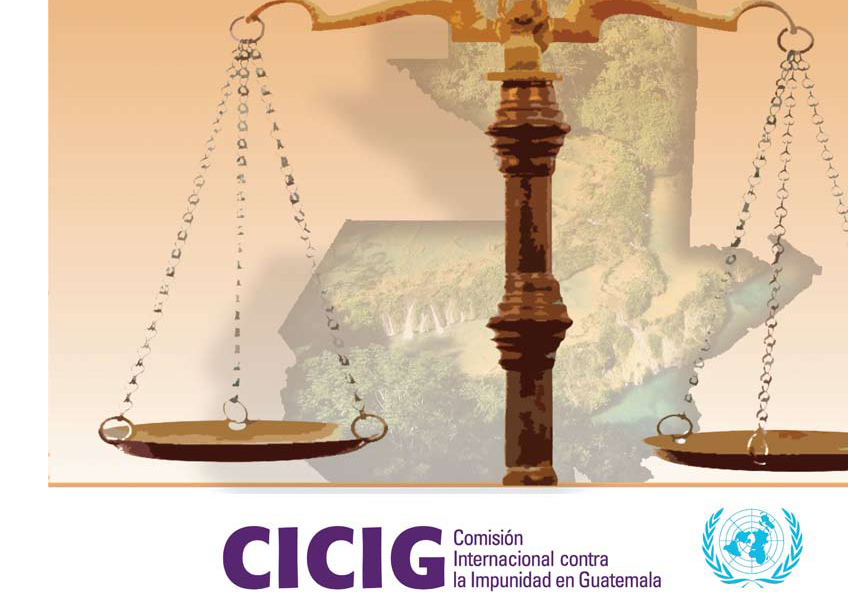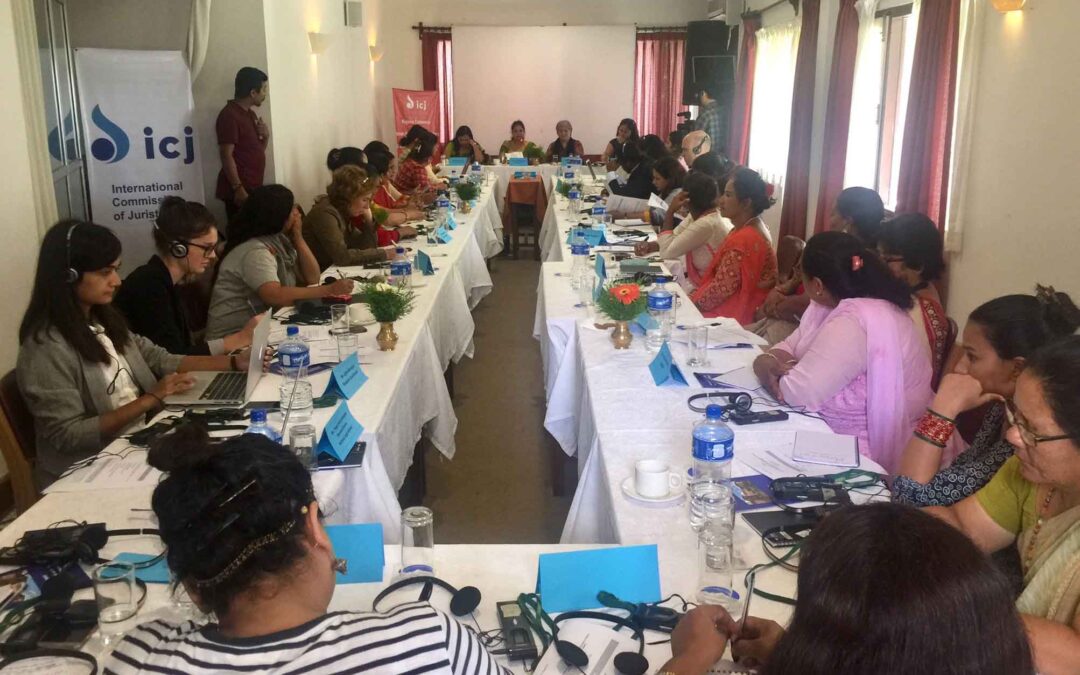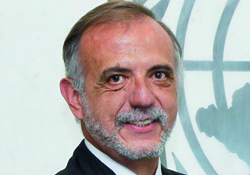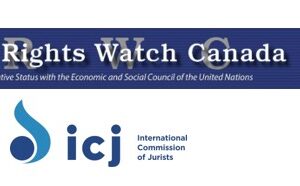
Aug 30, 2017 | Comunicados de prensa, Noticias
La CIJ considera que la crisis institucional que se vive en Guatemala requiere la intervención directa del Secretario General de Naciones Unidas Sr. Antonio Guterres.
La CIJ a la comunidad nacional e internacional expresa:
1. El Acuerdo entre La Organización de las Naciones Unidas y el Gobierno de Guatemala, relativo al establecimiento de una Comisión Internacional contra la Impunidad en Guatemala (CICIG), en su punto 10 numeral 4. , establece el compromiso del Gobierno, de proporcionar a la CICIG y a su personal, en todo el territorio, “la seguridad necesaria para el cumplimiento eficaz de sus actividades”. Además, el punto 10 citado anteriormente, compromete al Gobierno de Guatemala a velar por que el personal de la CICIG, nacional o internacional, no sea objeto de abusos, amenazas, represalias o intimidaciones, por el desempeño de su trabajo.
2. Los actos unilaterales del Presidente Jimmy Morales constituyen una violación a dichas garantías y pueden interpretarse como un mecanismo para afectar el eficiente trabajo que viene realizando el Comisionado Iván Velásquez al frente de la CICIG; para obstaculizar la justicia, para interferir en la Independencia del Poder Judicial y promover así, más impunidad en el país.
3. La decisión de la Corte de Constitucionalidad de dejar en suspenso en forma definitiva el acto reclamado por el Procurador de los Derechos Humanos y de esa forma, dejar sin efecto el acto unilateral por medio del cual el Presidente Jimmy Morales declaró “persona non grata” al Comisionado Velásquez, viene a reforzar el Estado de Derecho en Guatemala y fortalece al máximo Tribunal Constitucional.
Sam Zarifi, Secretario General de la Comisión Internacional de Juristas expresó:
“Ante la crisis institucional que se vive en Guatemala, la Comisión Internacional de Juristas considera que es necesaria la intervención directa del Secretario General de Naciones Unidas Sr. Antonio Guterres mediante una Misión de Alto Nivel, que permita evaluar “in loco”, si el Gobierno de Guatemala está dispuesto a honrar el Acuerdo firmado en la ciudad de Nueva York el 12 de diciembre de 2006.”
“El Gobierno de Guatemala debe dar a la Organización de las Naciones Unidas, garantías convincentes de que la CICIG, el Comisionado Iván Velásquez y todo su personal nacional e internacional, podrán cumplir en el futuro con sus funciones, sin abusos, amenazas, represalias o intimidaciones de ningún tipo,” concluyó.

Aug 29, 2017 | News, Publications, Reports, Thematic reports
South Asian states can only address the tens of thousands of cases of enforced disappearances by recognizing enforced disappearance as a serious crime in domestic law, said the ICJ today.
On the eve of the International Day of the Victims of Enforced Disappearances, the ICJ 58-page report No more ‘missing persons’: the criminalization of enforced disappearance in South Asia analyzes States’ obligations to ensure that enforced disappearance constitutes a distinct, autonomous crime under national law.
It also provides an overview of the practice of enforced disappearance, focusing specifically on the status of the criminalization of the practice, in five South Asian countries: India, Pakistan, Bangladesh, Sri Lanka and Nepal.
For each State, the report briefly examines the national context in which enforced disappearances are reported, the existing legal framework, the role of the courts; and the international commitments and responses to recommendations concerning criminalization.
“It is alarming that despite the region having some of the highest numbers of reported cases of disappearances in the world, enforced disappearance is not presently a distinct crime in any South Asian country,” said Frederick Rawski, ICJ’s Asia Director.
“This shows the lack of political will to hold perpetrators to account and complete apathy towards victims and their right to truth, justice and reparation,” he added.
In Nepal and Sri Lanka, draft legislation to criminalize enforced disappearance is under consideration.
Though the initiatives are welcome, the draft bills in both countries are flawed and require substantial improvements to meet international standards.
In the absence of a clear national legal framework specifically criminalizing enforced disappearance, unacknowledged detentions by law enforcement agencies are often treated by national authorities as “missing persons” cases.
On the rare occasions where criminal complaints are registered against alleged perpetrators, complainants are forced to categorize the crime as “abduction”, “kidnapping” or “unlawful confinement”.
These categories do not recognize the complexity and the particularly serious nature of enforced disappearance, and often do not provide for penalties commensurate to the gravity of the crime.
They also fail to recognize as victims relatives of the “disappeared” person and others suffering harm as a result of the enforced disappearance, as required under international law.
“Like torture and extrajudicial execution, enforced disappearance is a gross human rights violation and a crime under international law,” said Rawski.
“South Asian States must recognize that they have an obligation to criminalize the practice with penalties commensurate with the seriousness of the crime–filing “missing” person” complaints in cases of disappearance is not enough, and in fact, it trivializes the gravity of the crime,” he added.
Other barriers to bringing perpetrators to account are also similar across South Asian countries: military and intelligence agencies have extensive and unaccountable powers, including for arrest and detention, often in the name of “national security”; members of law enforcement and security forces enjoy broad legal immunities, shielding them from prosecution; and military courts have jurisdiction over crimes committed by members of the military, even where these crimes are human rights violations, and proceedings before such courts are compromised by their lack of independence and impartiality.
Victims’ groups, lawyers, and activists who work on enforced disappearance also face security risks including attacks, harassment, surveillance, and intimidation.
A comprehensive set of reforms, both in law and policy, is required to end the entrenched impunity for enforced disappearances in the region – criminalizing the practice would be a significant first step, said the ICJ.
Contacts:
Frederick Rawski (Bangkok), ICJ Asia Pacific Regional Director, e: frederick.rawski(a)icj.org
Reema Omer, ICJ International Legal Advisor (South Asia) t: +923214968434; e: reema.omer(a)icj.org
Thyagi Ruwanpathirana, ICJ National Legal Advisor (Sri Lanka), e: thyagi.ruwanpathirana(a)icj.org
Background
Under international law, an enforced disappearance is the arrest, abduction or detention by State agents, or by people acting with the authorization, support or acquiescence of the State, followed by a refusal to acknowledge the detention or by concealing the fate or whereabouts of the “disappeared” person which places the person outside the protection of the law.
The UN General Assembly has repeatedly described enforced disappearance as “an offence to human dignity”.
South Asia-Enforced Disappearance-Publications-Reports-Thematic Reports-2017-ENG (full report in PDF)

Aug 29, 2017 | News
Today, the ICJ concluded its Regional Conference on Women Human Rights Defenders as Political Actors, which gathered in Kathmandu women human rights defenders (WHRDs) from all over Nepal who were recently elected during the local elections in May 2017.
They were joined by Bushra Gohar, a former Member of Parliament in Pakistan, Ahmed Naaif of the Maldivian Democracy Network, and Sherene Xavier, a filmmaker and WHRD from Sri Lanka.
The discussions focused on how the newly-elected WHRDs can continue to advance human rights in their new roles as elected officials.
Under Nepal’s Local Level Election Act 2017, political parties are required to field female candidates for half of the executive posts (mayor/deputy mayor) and at least 40% for membership at the local community councils.
In May 2017, during the first local election held in the country in almost 20 years, approximately 20,000 women stood for elections, including WHRDs.
Most of the women candidates, however, were fielded by the political parties for the deputy mayor posts. At least 92% of the candidates fielded for the mayoral posts were men.
The discussions during the two-day conference (28-29 August 2017) focused on how these affirmative measures should be utilized by women human rights defenders in Nepal to advance equal participation of women in public affairs and further their advocacy for human rights.
There was some caution expressed by some of the women that these measures may reinforce the already disadvantaged place women hold in public life and may also be viewed as tokenism.
Participants in the conference discussed as well how as WHRDs, they would need to deal with human rights abuses allegedly committed by their political parties against women.
The need for WHRDs in politics to have their own support system was also emphasized during the conference.
The participants of the conference ran under the banner of various political parties in Nepal.
The National Alliance of Women Human Rights Defenders of Nepal collaborated with ICJ in organizing the conference.
The conference was opened with a keynote speech from Justice Sapana Pradhan Malla of the Supreme Court of Nepal, who spoke about the challenging path women politicians face.
Former Chief Justice Kalyan Shrestha, Commissioner of the ICJ, chaired the opening ceremonies.

Aug 28, 2017 | Comunicados de prensa, Noticias
La CIJ dice que la declaración de Iván Velásquez como persona no grata es un fraude de ley y sin efecto legal.
La CIJ a la comunidad nacional e internacional expresa:
- Que la decisión del Presidente Morales de declarar “non grato” y de expulsar del país a Comisionado Iván Velásquez (foto), es nula “de pleno derecho” y no nació a la vida jurídica por las siguientes razones:
- Fue emitida de “mala fe” por el Presidente Morales, ya que el verdadero objetivo de la misma es obstruir a la justicia y proteger a él y a su familia; en tal sentido viola la Convención de Viena sobre el Derecho de los Tratados (artículo 26), ratificada por el Estado de Guatemala;
- Por tal razón, se trata de un acto contrario al Derecho internacional de los Derechos Humanos, que también viola el artículo 149 de la Constitución Política de la República de Guatemala;
- Nuevamente se configura el “fraude de ley“, de conformidad con el artículo 4. segundo párrafo, de la Ley del Organismo Judicial (Dto. 2-89 del Congreso de la República), ya que de conformidad con dicho artículo “los actos realizados al amparo del texto de una norma, que persigan un resultado prohibido por el ordenamiento jurídico, o contrario a él, se consideran ejecutadas en fraude de ley y no impedirán la debida aplicación de la norma que se hubiere tratado de eludir”;
- El Presidente Morales resolvió declarar non grato al Comisionado Velásquez para obstruir la justicia y provocar más impunidad; es importante recordar que la lucha contra la impunidad constituye una norma imperativa delDerecho internacional, de carácter obligatorio y que no admite derogación alguna;
- El acto unilateral del Presidente Morales atenta contra la Independencia Judicial. En menos de dos meses, es la segunda vez que el Presidente Morales comete este tipo de hecho antijurídico, ya que con anterioridad, trató de influir ilegalmente en los magistrados de la Corte Suprema de Justicia;
- Según el artículo 4. primer párrafo de la Ley del Organismo Judicial citada, “los actos contrarios a las normas imperativas y a las prohibitivas expresas, son nulos de pleno derecho”.
- Por todo ello, la CIJ pide al Ministerio Público abrir un expediente en contra del Presidente Morales y hacer todo lo que esté a su alcance, para que se deduzcan las responsabilidades penales y civiles a que da lugar, la conducta ilegal del Presidente de la República.
- La CIJ apoya y valora altamente la gestión del Comisionado de la CICIG Iván Velásquez
Ramón Cadena, Director de la CIJ para Centroamérica expresó:
“La decisión del Presidente Jimmy Morales es inaceptable y su actitud de no cumplir con la resolución que otorga amparo provisional de la Corte de Constitucionalidad debe ser acatada por él en forma inmediata. De lo contrario, estará incurriendo en otro delito.”

Aug 24, 2017 | News
Today, the Indian Supreme Court delivered a landmark judgment declaring the right to privacy an intrinsic part of the right to life and liberty under Article 21 of India’s Constitution.
The ICJ welcomed a momentous and courageous judgment, where the Supreme Court took an expansive view of the right to privacy, and held that, at its core, privacy includes “the preservation of personal intimacies, the sanctity of family life, marriage, procreation, the home and sexual orientation…”
As such, this judgment is an important step towards scrapping laws criminalizing same-sex activity in the country, the ICJ said.
“The judgment is a testament to the inspiring work of human rights activists and lawyers in India, who have shown the potential of the law to affirm human rights and equality,” said Frederick Rawski, ICJ’s Asia Director.
“The ruling could have far-reaching implications for a number of cases -including with respect to the criminalization of consensual same-sex relations – where laws, policy and practices have been challenged on the basis that they violate the right to privacy,” he added.
The judgment clarified that the right to privacy is not spatially bound and exists beyond four walls as it “attaches to the person” and is not “lost or surrendered merely because the individual is in a public place.”
Significantly, in explaining the ambit of the right to privacy, the Supreme Court held that sexual orientation is “an essential component of identity” and “equal protection demands protection of the identity of every individual without discrimination.”
The Court also highlighted that laws criminalizing same-sex activity have a “chilling effect on the exercise of the right”, posing “a grave danger to the unhindered fulfillment of one’s sexual orientation, as an element of privacy and dignity.”
Section 377 of the Indian Penal Code criminalizes voluntary “carnal intercourse against the order of nature with any man, woman or animal” and prescribes a range of penalties including life imprisonment.
In Naz Foundation v. Govt. of NCT of Delhi, the Delhi High Court in 2009 read down the application of section 377, holding, among other things, that insofar as it criminalizes consensual sexual acts, it violates Articles 21 (right to life and liberty), 14 (equal protection of the law) and 15 of the Constitution (freedom from discrimination) of the Indian Constitution.
However, in Suresh Kumar Koushal in December 2013, the Supreme Court reversed the 2009 Delhi High Court ruling, effectively recriminalizing homosexuality.
The petitioners challenged the ruling in Koushal, and in February 2016, the Indian Supreme Court referred a “curative petition” to a five-judge bench of the Supreme Court for consideration.
In today’s judgment, the Supreme Court questioned the rationale in Koushal, and expressed disagreement with the manner in which Koushal dealt with the “privacy–dignity based claims of LGBT persons.”
It also found the reasoning in Koushal flawed and unsustainable for being discriminatory towards LGBT persons by calling them “a miniscule fraction of the country’s population” and making that the basis for denying their right to privacy.
However, the Court held that since a challenge to section 377 is pending before a larger bench, its constitutional validity would be decided in the appropriate proceedings.
“The Supreme Court’s judgment is indeed historic, but the real test of its impact will be whether the right to privacy it affirms is given effect in its true spirit in individual cases, so as to ensure that laws, policies and practices meet India’s obligations under the Constitution as well as international standards,” added Rawski.
Contact:
Frederick Rawski (Bangkok), ICJ Asia Pacific Regional Director, e: frederick.rawski(a)icj.org
Ajita Banerjie, ICJ Consultant in Delhi, t: +918447784157; e: ajita.banerjie(a)icj.org
India-Privacy & section 377-News-web stories-2017-ENG (full story in PDF)









